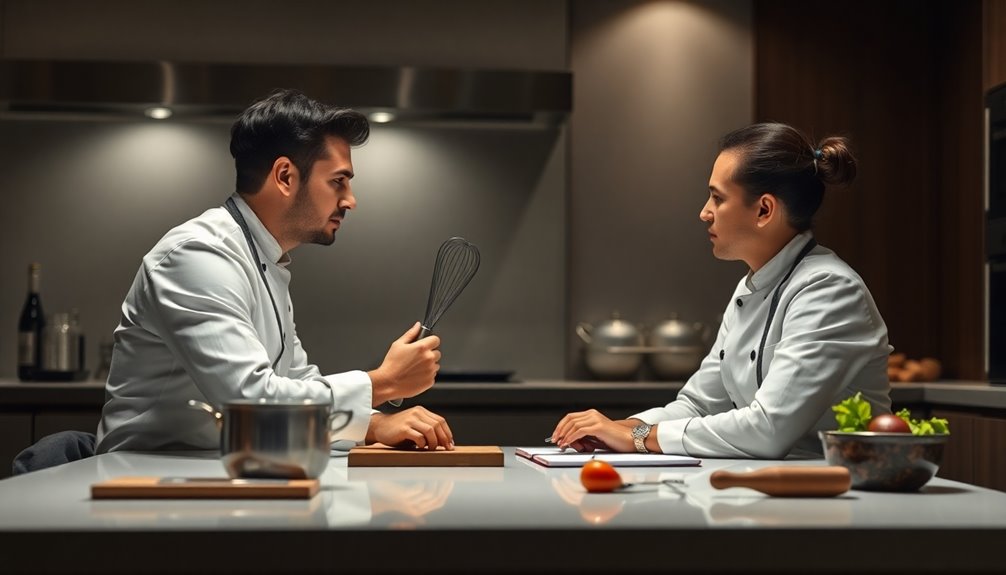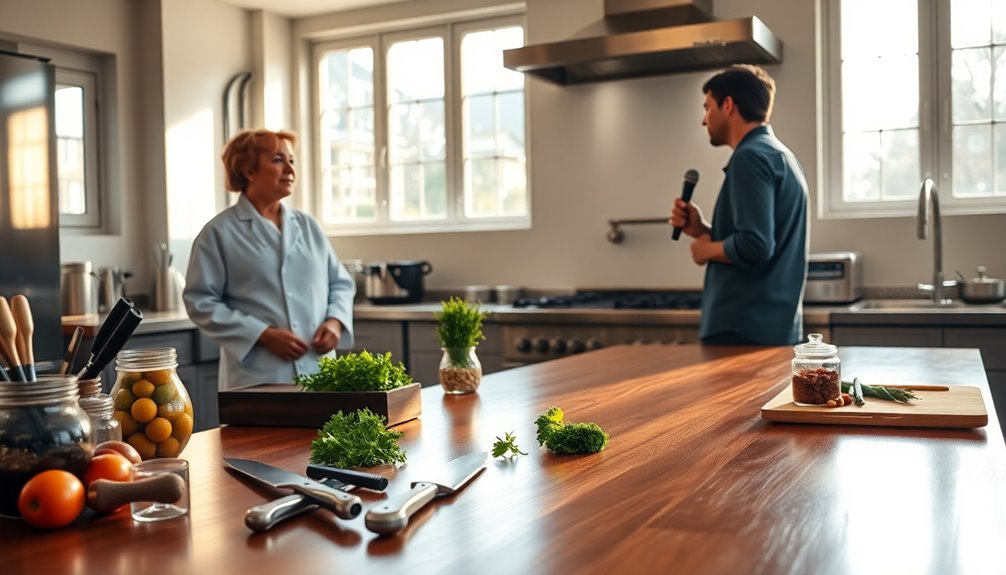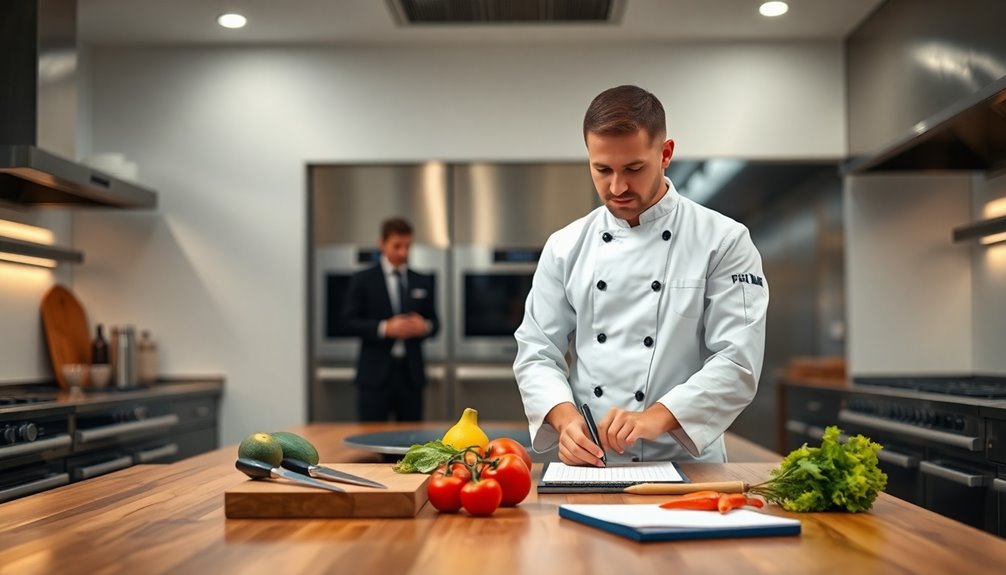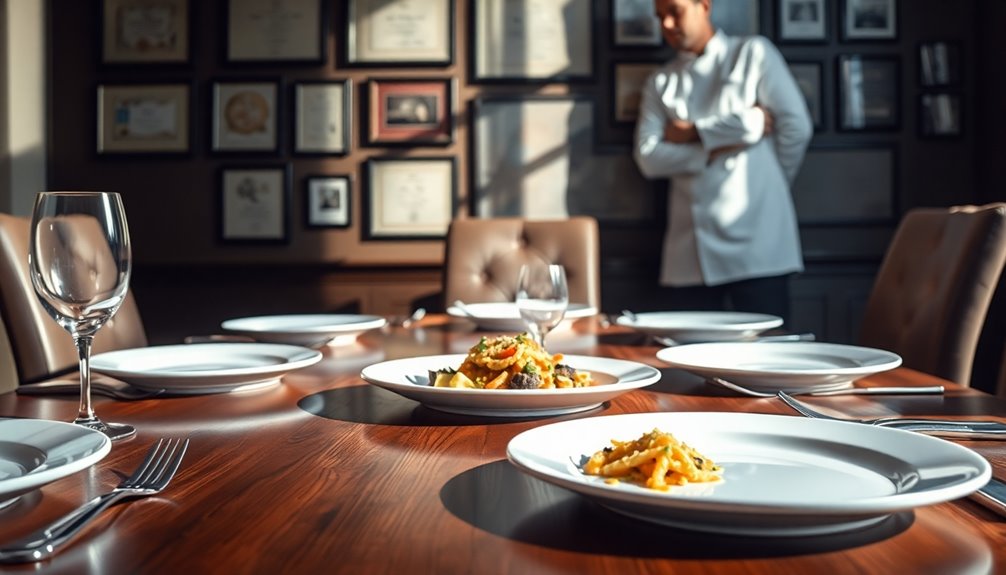Mastering chef interviews means preparing for key questions that highlight your culinary experience and leadership skills. You'll face inquiries about your passion for cooking, management style, and how you handle kitchen challenges. Expect scenario-based questions where you can showcase your problem-solving abilities using the STAR method. Be ready to address customer service dilemmas gracefully and share your proud kitchen moments. It's also essential to understand the restaurant's values and trends in the food industry. By preparing thoughtfully, you can present yourself confidently and authentically, paving the way for success in your culinary career. There's much more to explore.
Key Takeaways
- Prepare for general questions about your passion for cooking and career goals to convey enthusiasm and commitment.
- Highlight your culinary experience, including training, certifications, and proud achievements to showcase your skills.
- Use the STAR method to effectively respond to scenario-based questions, demonstrating problem-solving and adaptability.
- Discuss strategies for handling customer service challenges gracefully, focusing on active listening and prompt responses.
- Share your leadership style and conflict resolution methods to illustrate your ability to manage and inspire a kitchen team.
General Interview Preparation

Preparation is key to mastering chef interviews, and it starts with understanding the types of questions you might encounter. Expect general questions like "Tell me about yourself" and "What are five words to describe yourself?" that assess your personality and work style.
You'll also face inquiries about your passion for cooking and your career goals over the next five years. Practicing your answers boosts confidence; try rehearsing in front of a mirror or with a friend for feedback.
Additionally, research the restaurant's history, values, and menu to engage in informed discussions. Prepare thoughtful questions to ask the interviewers, showing your genuine interest and enthusiasm for the position. This groundwork sets you up for success.
Culinary Experience and Skills

Having honed your culinary skills through formal education and hands-on experience, it's crucial to articulate your background effectively during interviews. Highlight your culinary training, certifications, and any specialized courses you've completed.
Discuss your management experience, including the number of staff you've overseen and your leadership style. Be ready to share your proudest moments in the kitchen, such as successful menu developments or innovative dishes you've created.
Show your awareness of food industry trends and your commitment to ingredient freshness. Your ability to communicate clearly and listen actively during the interview will demonstrate your professionalism.
Scenario-Based Questions

During interviews, scenario-based questions can reveal how you think on your feet and handle real-world challenges in a kitchen environment.
You'll often face questions like "Describe a time you dealt with a difficult employee" or "How did you adapt a meal for dietary restrictions?" These questions assess your problem-solving ability and adaptability.
To shine, use the STAR method: describe the Situation, Task, Action, and Result. This structured approach helps you clearly convey your thought process and outcomes.
Be prepared to discuss how you perform under pressure and resolve conflicts, as these skills are essential in a fast-paced kitchen. Understanding how to manage emotional and social impacts during stressful situations can also enhance your responses.
Ultimately, your responses will demonstrate your capacity to thrive in challenging scenarios and collaborate effectively with your team.
Customer Service Challenges

Customer service challenges in the culinary world can make or break a dining experience. You'll likely face dissatisfied guests, dietary restrictions, and unexpected complaints.
It's essential to listen actively and respond promptly to their concerns. When a meal doesn't meet expectations, your ability to handle the situation with grace can turn a negative experience into a positive one.
Be prepared to offer alternatives or adjustments, ensuring customers feel valued. Remember, maintaining a calm demeanor, even under pressure, showcases your professionalism.
Additionally, gathering feedback can help you enhance your dishes and service. By demonstrating empathy and a willingness to improve, you not only resolve issues but also build loyalty, encouraging guests to return despite any challenges they encountered.
Leadership and Management Style

Effective leadership and management style in a kitchen can greatly influence team dynamics and overall restaurant success. You need to demonstrate your ability to motivate and inspire your team while setting clear expectations.
Consider sharing your approach to communication—how do you guarantee everyone feels valued and heard?
Discuss your conflict resolution strategies; handling disagreements professionally is essential in a high-pressure environment. Be prepared to explain your decision-making process, especially when it comes to staffing and menu development.
Highlight how you foster collaboration, encourage creativity, and promote a positive work culture. Acknowledging the importance of team dynamics can help create a more cohesive and effective kitchen environment.
Ultimately, your leadership style should reflect your passion for culinary excellence and your commitment to developing your team, setting the stage for a thriving kitchen and restaurant atmosphere.
Post-Interview Strategies

Following up after your chef interview is essential for reinforcing your interest and professionalism. Start by sending a thank-you note within 24 hours, expressing gratitude for the opportunity and reiterating your enthusiasm for the position. This small gesture can leave a lasting impression.
Reflect on the interview to identify areas where you excelled and aspects you could improve upon for future opportunities. Keep track of the questions asked and your responses; this will help you refine your answers for next time.
Finally, if you haven't heard back within the expected timeframe, don't hesitate to follow up politely. This shows persistence and keeps your candidacy fresh in the interviewer's mind, demonstrating your commitment to the role.
Industry Knowledge and Trends

Staying informed about industry knowledge and trends can give you a significant edge in your chef interviews. You should familiarize yourself with current culinary movements, such as plant-based diets, sustainable sourcing, and global cuisine influences. This knowledge not only demonstrates your passion for the industry but also allows you to engage in meaningful conversations with interviewers.
Research the restaurant's specific offerings and how they align with these trends. Knowing their target audience and preferences can help you tailor your responses effectively.
Additionally, stay updated on recent news, awards, and innovations within the culinary world. This proactive approach signals your commitment and readiness, setting you apart from other candidates who may lack this insight.
Frequently Asked Questions
What Inspired You to Pursue a Career in the Culinary Field?
When someone asks what inspired you to pursue a career in the culinary field, think about those moments that ignited your passion.
Was it a family recipe that brought everyone together? Maybe a memorable dining experience sparked your creativity.
Reflect on how food connects people and cultures. Your enthusiasm for experimenting with flavors and sharing those creations can illustrate your commitment.
Emphasizing these experiences can showcase your genuine love for the culinary arts.
How Do You Handle Criticism From Peers and Customers?
Did you know that 70% of employees feel more engaged when they receive constructive feedback?
When you handle criticism from peers and customers, you embrace it as a chance to grow. You listen actively, acknowledge their concerns, and take notes if necessary.
Then, you reflect on their feedback, deciding what's actionable. This approach not only improves your skills but also builds trust and shows that you value their opinions in the kitchen.
Describe Your Favorite Cuisine and Why You Love It
When you think about your favorite cuisine, you probably feel a strong connection to its flavors and traditions.
Maybe it's Italian for its rich sauces and fresh ingredients, or perhaps Thai for its vibrant spices and balance.
You love how it brings people together, creating memorable experiences around the table.
Sharing these culinary delights with others not only showcases your skills but also sparks joy and conversation, making every meal a celebration.
What Hobbies Do You Have Outside of Cooking?
When you think about hobbies outside of cooking, consider what truly excites you.
Whether it's hiking, painting, or exploring new cultures through travel, each hobby adds depth to your personality.
Engaging in these activities can inspire your culinary creativity and help you unwind.
Don't forget to mention how these interests influence your cooking style or approach in the kitchen, showcasing your well-rounded character to others and enhancing your culinary perspective.
How Do You Maintain Work-Life Balance in a Demanding Kitchen Environment?
In the whirlwind of a kitchen, it can feel like you're juggling flaming knives while riding a unicycle!
To maintain a work-life balance, you've gotta set boundaries and prioritize self-care. Schedule your shifts, communicate needs to your team, and carve out time for hobbies.
Embrace relaxation techniques, like yoga or meditation, to recharge.
Conclusion
In wrapping up your chef interview prep, remember it's not just about answering questions; it's about sharing your culinary story. Embrace each inquiry as a chance to showcase your passion and creativity in the kitchen. With a sprinkle of confidence and a dash of preparation, you'll leave a lasting impression. So, step into that interview like you're entering your favorite kitchen—excited and ready to whip up something extraordinary! Your culinary adventure awaits!









